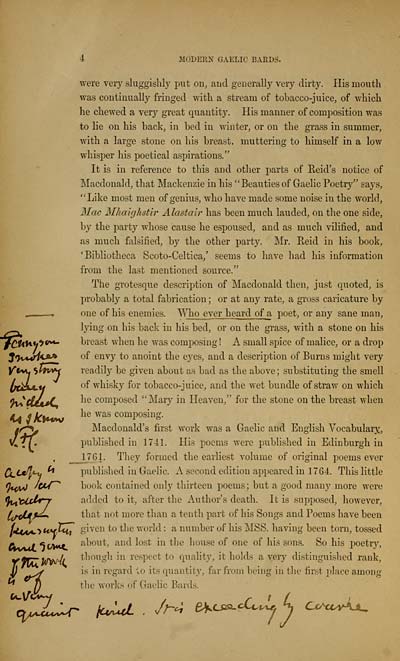Download files
Complete book:
Individual page:
Thumbnail gallery: Grid view | List view

4 MODERN GAELIC BARDS.
were very sluggishly put on, and generally very dirty. His mouth
was continually fringed with a stream of tobacco-juice, of which
he chewed a very great quantitj''. His manner of composition was
to lie on his back, in bed in winter, or on the grass in summer,
with a large stone on his breast, muttering to himself in a low
whisper his poetical aspirations."
It is in reference to this and other parts of Reid's notice of
Macdonald, that Mackenzie in his "Beauties of Gaelic Poetry" says,
"Like most men of genius, who have made some noise in the world,
Mac Mhaighstir Alastair has been much lauded, on the one side,
by the party whose cause he espoused, and as much vilified, and
as much falsified, by the other party. Mr. Reid in his book,
'Bibliotheca Scoto-Celtica,' seems to have had his information
from the last mentioned source."
The grotesque description of Macdonald then, just quoted, is
probably a total fabrication ; or at any rate, a gross caricature by
one of his enemies. Who ever heard of a poet, or any sane man,
lying on his back in his bed, or on the grass, with a stone on his
breast when he was composing ! A small spice of malice, or a drop
of envy to anoint the eyes, and a description of Burns might very
readily be given about as bad as the above ; substituting the smell
of whisky for tobacco-juice, and the wet bundle of straw on which
he composed "Mary in Heaven," for the stone on the breast when
he was composing.
Macdonald's first work was a Gaelic and English Vocabulary,
published in 1741. His poems were published in Edinburgh in
J^761. They formed the earliest volume of original poems ever
published in Gaelic. A second edition appeared in 1764. This little
book contained only thirteen poems; but a good many more were
added to it, after the Author's death. It is supposed, however,
that not more than a tenth part of his Songs and Poems have been
ULu/*,') t<H^M^ given to tlie world : a number of his MS)S. having been torn, tossed
/», i(AKC •'^^^out, and lost in tlie house of one of his sons. So his poetry,
yfr~UPVv^i '^^^"^^^o^' ^i^ respect to quahty, it holds a very distinguished rank,
V t^ ^^ '^^^ regard to its quantity, far from being in the first place among
^ 1^ tlic works of Gaelic Bards.
were very sluggishly put on, and generally very dirty. His mouth
was continually fringed with a stream of tobacco-juice, of which
he chewed a very great quantitj''. His manner of composition was
to lie on his back, in bed in winter, or on the grass in summer,
with a large stone on his breast, muttering to himself in a low
whisper his poetical aspirations."
It is in reference to this and other parts of Reid's notice of
Macdonald, that Mackenzie in his "Beauties of Gaelic Poetry" says,
"Like most men of genius, who have made some noise in the world,
Mac Mhaighstir Alastair has been much lauded, on the one side,
by the party whose cause he espoused, and as much vilified, and
as much falsified, by the other party. Mr. Reid in his book,
'Bibliotheca Scoto-Celtica,' seems to have had his information
from the last mentioned source."
The grotesque description of Macdonald then, just quoted, is
probably a total fabrication ; or at any rate, a gross caricature by
one of his enemies. Who ever heard of a poet, or any sane man,
lying on his back in his bed, or on the grass, with a stone on his
breast when he was composing ! A small spice of malice, or a drop
of envy to anoint the eyes, and a description of Burns might very
readily be given about as bad as the above ; substituting the smell
of whisky for tobacco-juice, and the wet bundle of straw on which
he composed "Mary in Heaven," for the stone on the breast when
he was composing.
Macdonald's first work was a Gaelic and English Vocabulary,
published in 1741. His poems were published in Edinburgh in
J^761. They formed the earliest volume of original poems ever
published in Gaelic. A second edition appeared in 1764. This little
book contained only thirteen poems; but a good many more were
added to it, after the Author's death. It is supposed, however,
that not more than a tenth part of his Songs and Poems have been
ULu/*,') t<H^M^ given to tlie world : a number of his MS)S. having been torn, tossed
/», i(AKC •'^^^out, and lost in tlie house of one of his sons. So his poetry,
yfr~UPVv^i '^^^"^^^o^' ^i^ respect to quahty, it holds a very distinguished rank,
V t^ ^^ '^^^ regard to its quantity, far from being in the first place among
^ 1^ tlic works of Gaelic Bards.
Set display mode to: Large image | Transcription
Images and transcriptions on this page, including medium image downloads, may be used under the Creative Commons Attribution 4.0 International Licence unless otherwise stated. ![]()
| Early Gaelic Book Collections > J. F. Campbell Collection > Selections from the Gaelic bards > (28) |
|---|
| Permanent URL | https://digital.nls.uk/77158975 |
|---|
| Description | Volumes from a collection of 610 books rich in Highland folklore, Ossianic literature and other Celtic subjects. Many of the books annotated by John Francis Campbell of Islay, who assembled the collection. |
|---|
| Description | Selected items from five 'Special and Named Printed Collections'. Includes books in Gaelic and other Celtic languages, works about the Gaels, their languages, literature, culture and history. |
|---|

